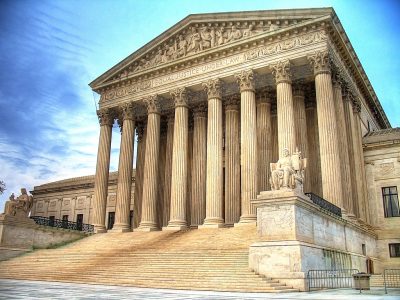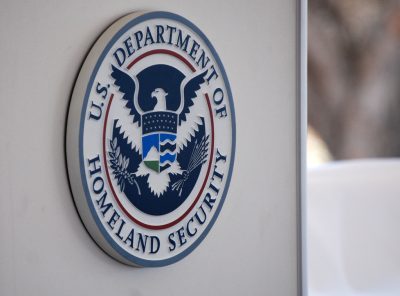Due Process and the Courts
What does the constitution say about due process?
The Fifth Amendment to the Constitution says clearly that no person shall be deprived of life, liberty, or property without the due process of law. Note that this says person, not citizen, and over the years the Supreme Court has consistently ruled that the Due Process Clause applies to all people in the United States.Do non-citizens have the right to due process in the U.S.?
Yes. The Constitution guarantees due process rights to all "persons," not just citizens. This means non-citizens, including undocumented immigrants, are entitled to fair treatment under the law. This includes the right to defend themselves in court. But recent Trump administration policies that speed up deportations and limit access to legal representation make it harder for non-citizens to get their fair day in court.- Access to legal representation Access to legal counsel is an essential part of our justice system and our democracy. In the criminal justice system, anyone facing even one day in jail gets a lawyer if they can't afford one. But immigrants facing deportation usually don't get that chance.The research is clear – the most effective way to ensure some level of due process for people navigating our complicated immigration system is for them to have trained attorney at their side. But Trump administration is now working to strip attorneys from as many people as possible, all in the name of increasing its deportation numbers. This attempt to eliminate basic due process will hurt people who already have few options.
- Fair day in court Due process guarantees that individuals have the opportunity to defend themselves in court. This includes non-citizens facing deportation.
Why is due process important?
We are seeing right now the importance of due process when it comes to President Trump's actions to carry out the so-called Alien Enemies Act, a 1798 wartime law that permits people to be deported outside of the normal framework of immigration law. President Trump has alleged that this law allows him to simply point at any person, declare them to be an alien enemy, and kick them out of the country without ever having a chance to see a judge. Thankfully, the Supreme Court said that is not true, and in a unanimous decision, ruled that people can challenge the Trump administration's invocation of the Alien Enemies Act. That is why due process is so important, because it means that no person can be rounded up and sent to another country without a chance to go to court and make the government prove their case.How is the American Immigration Council working to protect due process?
- We serve thousands of individuals in immigration detention centers through the Immigration Justice Campaign, our initiative with the American Immigration Lawyers Association. The Justice Campaign provides free legal services for immigrants who would otherwise have to navigate our complicated immigration system without a lawyer.
- We use the courts to demand a fair process for immigrants. Our litigation team is fighting back against the Trump administration’s blatant disregard for due process including filing a lawsuit challenging their illegal detention of immigrants in El Salvador’s notorious Terrorism Confinement Center (CECOT).

Why More Immigration Judges Are Needed
If there is any aspect of immigration reform over which there should be no partisan disagreement, it is the dire need to increase the number of immigration judges. As most Republicans and Democrats can probably agree, immigration judges are essential for the functioning of immigration enforcement (removing people who shouldn’t… Read More

Arpaio Faces Skeptical Judges In Lawsuit Challenging Obama’s Immigration Action
It is unsurprising that the press is paying close attention to Texas v. United States, the case filed by Texas and a number of other states challenging President Obama’s executive actions on immigration. After all, that lawsuit has resulted in a widely-criticized order temporarily blocking millions of undocumented immigrants… Read More

Supreme Court to Decide Whether It’s Okay to Deprive a Person of His Day In Immigration Court
Every day in immigration courts around the country, people facing deportation try to explain why they should be allowed to remain in the United States under our notoriously complex immigration laws. Those who have legal representation rely on their attorneys to follow procedures and make arguments that may be virtually… Read More

No Justice For Family of Mexican Child Killed By U.S. Border Patrol Agent
On June 7, 2010, Sergio Adrian Hernandez Guereca, a fifteen-year-old Mexican national, was playing with a group of friends on the Mexican side of the border near the Paso del Norte Bridge in El Paso, Texas. The boy and his friends were playing a game in which they ran up… Read More

The Court Decision on Deferred Action Everyone Should Be Talking About
Yesterday, in Crane v. Johnson, the Fifth Circuit Court of Appeals (the same court deciding whether or not to keep in place the preliminary injunction blocking the President’s executive actions) unanimously dismissed a lawsuit challenging the original 2012 Deferred Action for Childhood Arrivals (DACA) program. The court held that… Read More

Leaders From Across U.S. Urge Court to End Injunction in Immigration Action Case
Multiple legal briefs are being filed today in support of ending the injunction against the Obama Administration’s expansion of deferred action. On February 16, 2015, a Texas federal judge issued a preliminarily injunction against the implementation of the expanded Deferred Action for Childhood Arrivals (DACA) and Deferred Action for Parents… Read More

New Immigration Enforcement Policy Remains In Effect Despite Texas Lawsuit
The political lawsuit challenging the legality of parts of President Obama’s Executive Action should fail for a variety of reasons. But the lawsuit has already succeeded in two respects. First, it won a dubious preliminary injunction from a lower court judge temporarily halting the program while… Read More

Supreme Court Hears Argument on Whether Government Must Justify Its Visa Denial
The U.S. Supreme Court heard oral argument Monday in a case pitting a U.S. citizen who wants to live in the United States with her foreign national spouse against the U.S. government, which is intent on preventing even a modest level of court review when an immigrant visa is denied. Read More

Court Orders DHS to Stop Detaining Mothers and Children to Deter Future Immigration Flow
In June 2014, the Department of Homeland Security (DHS) began implementing a border security policy of detaining nearly all mothers and children fleeing violence and persecution in Central America. DHS vastly increased its detention capacity for families to “send the message unequivocally that if you come here you… Read More

Justice Department Files Emergency Stay in Decision Against President Obama’s Executive Actions
The Justice Department on Monday filed an emergency stay asking the federal judge in Texas to lift the temporary hold (preliminary injunction) he issued on President Obama’s executive actions. Texas-based Judge Andrew Hanen issued the injunction against two of the President’s initiatives, namely, the expansion of… Read More
Make a contribution
Make a direct impact on the lives of immigrants.
